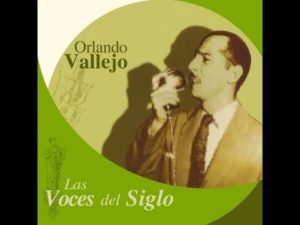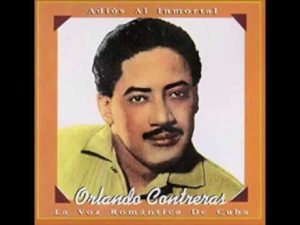 EN DUELO DE BOLEROS “LOS ORLANDOS”; CONTRERAS Y VALLEJO.
EN DUELO DE BOLEROS “LOS ORLANDOS”; CONTRERAS Y VALLEJO.
El bolero tiene su máxima expresión en Cuba alrededor de los años 50 del pasado siglo. Gozaba de gran popularidad, desplazando a un segundo plano a géneros tan contagiosos como el cha cha cha y el mambo.
Un sin número de cantantes cubanos obtuvieron un lugar en la cima de la música cantando boleros sobretodos en los años comprendido entre 1950 y 1960. Dentro de los más destacados podemos mencionar a Roberto Faz, Rolando Laserie, Benny Moré, Olga Guillot, Celia Cruz, Omara Portuondo y Elena Burke, entre otros.
Coincidentemente el destino juntó a dos voces increíbles, grandes exponentes del bolero, que a pesar de compartir su pasión por la música y su nombre, se convirtieron en figuras principales de un insólito dueto musical.
Estos talentosos intérpretes fueron Orlando Vallejo y Orlando Contreras, más conocidos como “Los Orlandos´´.
Contreras nació en 1930 y es recordado como “la voz romántica de Cuba´´, bolerista intachable.
Formó parte del conjunto casino y de la orquesta de Neno González. Posteriormente decidió lanzarse en solitario, forjando una carrera muy exitosa gracias a sus cualidades vocales.
De esta forma logró posicionarse entre los artistas más escuchados en la radio durante las décadas de 1950, 1960 y 1970.
Dentro de sus grandes éxitos se encuentran “Por un puñado de oro”, “Arráncame la vida”, “En un beso la vida”, entre otros títulos.
Mientras que Orlando Vallejo nació en el año 1918, fue de igual modo un gran bolerista, formó parte de diferentes agrupaciones como el conjunto Kubavana, la Orquesta América, acompañó en disimiles ocasiones a la Orquesta Aragón y cantó junto al Conjunto Casino.
https://youtu.be/R9irBmh_iqw
Durante su carrera en solitario logró sumar un número considerable de discos y en la lista de sus canciones más escuchadas se encuentran ‘Sufrí mi cadena’, ‘Dudas de Mí’, ‘Ya no te quiero’ y ‘Perdido amor’, entre muchos otros.
Este baluarte del bolero cubano falleció en el año 1981.
La querella entre ambos cantantes se centra en una historia producida por la canción “Un Amigo mío´´, de Vallejo donde narra la decepción de un hombre al enterarse que su esposa lo traiciona con su mejor amigo.
En poco tiempo este tema fue un exitazo escuchado por todos y tiempo mas tarde se produce la contestación a la misma por parte de Orlando Contreras quien responde a través de un tema titulado “Amigo de que´´.
Ambos compositores se convirtieron en clásicos del bolero, de la canción cubana y latinoamericana.
En la actualidad aun los buenos amantes del bolero continúan escuchándolos y recordando con nostalgia a Los Orlandos.
Ambas figuras ponen en alto el bolero cubano, destacándose por su peculiar forma de hacer la música, que hacen vibrar las fibras más sensibles de quienes se acercan su obra. Las capacidades interpretativas de ambos músicos los colocan entre los mejores cantantes de bolero que ha tenido la música cubana.
 IN DUEL OF BOLEROS “LOS ORLANDOS”; CONTRERAS AND VALLEJO.
IN DUEL OF BOLEROS “LOS ORLANDOS”; CONTRERAS AND VALLEJO.
The bolero has its maximum expression in Cuba around the 50s of the last century. It enjoyed great popularity, displacing to a second plane such contagious genres as the cha cha cha and the mambo.
A number of Cuban singers obtained a place at the top of the music singing boleros especially in the years between 1950 and 1960. Among the most prominent we can mention, Roberto Faz, Rolando Laserie, Benny Moré, Olga Guillot, Celia Cruz, Omara Portuondo, and Elena Burke, among others.
Coincidentally, fate brought together two incredible voices, great exponents of the bolero, who despite sharing their passion for music and their name, became leading figures of an unusual musical duet.
These talented interpreters were Orlando Vallejo and Orlando Contreras, better known as “Los Orlandos”.
Contreras was born in 1930 and is remembered as “the romantic voice of Cuba”, an impeccable bolero.
He was part of the casino and the Neno González orchestra. Later he decided to launch solo, forging a very successful career thanks to his vocal qualities.
In this way he managed to position himself among the most listened to artists on the radio during the 1950s, 1960s and 1970s.
Among his greatest hits are “For a handful of gold”, “Arrancame life”, “In a kiss life”, among other titles.
While Orlando Vallejo was born in 1918, he was also a great bolero player, he was part of different groups such as the Kubavana ensemble, the Orquesta América, he accompanied on different occasions the Orquesta Aragón and sang along with the Conjunto Casino.
During his solo career he managed to add a considerable number of albums and in the list of his most listened to songs are ‘I suffered my chain’, ‘Dudas de Mí’, ‘I do not love you’ and ‘Lost love’, among many others.
This bulwark of the Cuban bolero died in 1981.
The quarrel between the two singers is centered on a story produced by the song “Un Amigo mío”, by Vallejo, which recounts the disappointment of a man when he learned that his wife betrayed him with his best friend.
In a short time, this issue was a smash heard by all and time later the answer to the same occurs on the part of Orlando Contreras who responds through a topic entitled “Friend of que”.
Both composers became classics of the bolero, of the Cuban and Latin American song.
At present, even the good bolero lovers continue listening to them and remembering ‘Los Orlandos’ with nostalgia.
Both figures highlight the Cuban bolero, standing out for its peculiar way of making music, which vibrate the most sensitive fibers of those who approach his work. The interpretative capacities of both musicians place them among the best bolero singers that Cuban music has had.
Agencies/ TodoCuba/ Internet Photos/ YouTube/ Arnoldo Varona/ www.TheCubanHistory.com
THE CUBAN HISTORY, HOLLYWOOD.



 < IN DUEL of Boleros "Los Orlandos"; Contreras and Vallejo. VIDEOS.
< IN DUEL of Boleros "Los Orlandos"; Contreras and Vallejo. VIDEOS.



